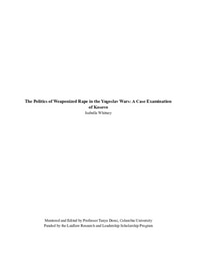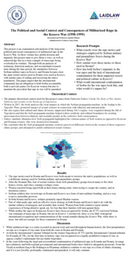Leadership-in-Action: Future Scholarship
From my work on the Asset Seizure Database, I started to develop an idea for a new research paper. Many of the articles I collected for this database focus on the role of the private sector individuals in seizing and repurposing these assets, mostly through pro bono work. It occurred to me that in the world we live in today, finding a way to make asset seizure and repurposing a profitable venture for private individuals might be the most effective way to ensure that reparations become more widespread, become the norm rather than the exception. I will be working on this paper for the foreseeable future, alongside my wonderful mentors at the Global Survivors Fund and other academic mentors, including Professor Rana Jaleel at UC Davis.
The first section of the paper will be devoted to the theoretical and the contextual. Among other things, it will answer the following questions:
- What are the implications of making humanitarian work profitable?
- Is it ethical to assign monetary value for human rights abuse compensation?
- What infrastructure exists to provide survivors with reparations already?
- What is the history of that infrastructure?
- Is it effective?
The second section of the paper will operate almost like a business model, or a series of them. It will outline a possible business strategy making the seizure of assets for the purposes of reparations profitable.
My work this summer has been an extraordinary, enriching experience, both inspiring new research ideas and reaffirming my passion for the material, and my desire to pursue this at the professional level. However, it also sparked some larger questions regarding reparative measures, and the delicate interplay between academic theory and practical application. After all, going back to my second post, theoretically, should human rights work be profitable? Is the idea that people would pursue human rights work possibly for the money even a benefit? My answer is, hesitatingly, yes.
To be clear, the answer should be no. In an ideal world, not only would human rights abuses not exist, but any pursuit of justice would be done without any concern for one’s economic security. That is, unfortunately, not the world that we live in today. Our lives are predicated on international economic institutions, and the ability to choose a profession with no regard for salary, benefits, or economic consideration of any kind is reserved for a privileged minority. I believe that getting survivors the reparative measures they need is more critical in the immediate than if we abide by a neoliberal system to get them. The theoretical questions regarding this subject are significant and should be interrogated, but their interrogation should not come at the expense of getting survivors the help that they need and deserve.
This approach also acknowledges that, unfortunately, international legal bodies and national governments are not always as effective or as quick-acting as would be ideal. Different acts of conflict-related sexual violence occur every single day across the globe. Survivors need and deserve reparative measures now.


Please sign in
If you are a registered user on Laidlaw Scholars Network, please sign in